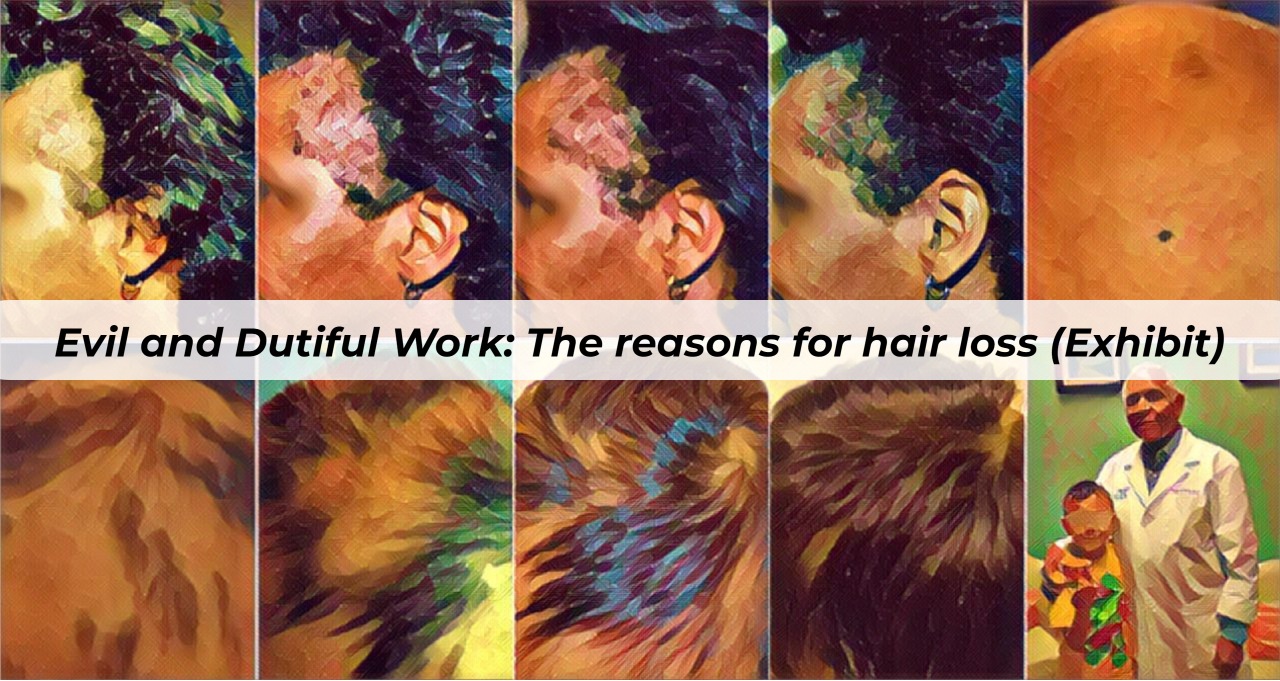INTRODUCTION
“The reason for hair loss is based off of circumstances that can allow it to happen, but it is not the circumstance itself. Those circumstances are based off of the reason.” – God, Almighty One
(Divine Insights from God, Samuel Emmanuel)
If asked about why you think hair loss happens, most likely your response will be circumstantial, such as due to stress and stressors, illness, “genetics,” and so on, or you might respond “I do not know.” In truth, “I do not know” is the best answer. This is because the reason for hair loss, or any malady at that, is based off of circumstances that can allow it to happen, but it is not the circumstance itself. In actuality, those circumstances are based off of the reason, which is spiritual: it pertains to the imperceptible area of existence that can only be understood and handled by faith in Jesus Christ.
“Reason” explains why something happens. Hair loss happens for a reason. Its manifestation is justified in accordance with God, His Word, which is the Law. In saying this, the reasons for hair loss offer revelatory insight into a spiritual judiciary that holds proceedings over the welfare of our existing. There are two reasons for hair loss: evil work and dutiful work. These reasons indicate who is to blame for hair loss, justify for two different types of hair loss, and reason through circumstances to justify outcomes of hair loss.
NECESSARY KNOWLEDGE
Review the following knowledge so that you might achieve the best understanding of the material.
- Although hair loss presents itself in the flesh, or physically, it should not be approached in the flesh. To do so would be futile. Hair loss has a spiritual basis and therefore should be approached in spirit (and truth). To go this route is efficacious. Exposé: The Proper Approach to Hair Loss (Baldness).
- “Cause” ascertains what makes something happen. It addresses the origin of hair loss and how it is that it happens. There are two causes of hair loss: sin and divine care. Sin is any act or state of non-compliance with God, His Word. Divine care is administration of God’s aid. Exposé: The Causes of Hair Loss (Baldness).
EVIL WORK
Preface on evil work
“Whoever makes a practice of sinning is of the devil, for the devil has been sinning from the beginning. The reason the Son of God appeared was to destroy the works of the devil.” (1 John 3:8 ESV).
In life, we have the choice of either practicing sin or obedience unto God. Sin is lawlessness (in 1 John 3:4 ESV). It is an unprincipled expression of reality that conveys brokenness. God’s Edict on Sin, His Word, declares that practitioners of sin deserve to die (Romans 1:32 ESV). Death is brought forth from sin, sin comprises malady, and malady that is of sin reeks of death. God’s Edict on Sin, His Word, informs us that sin is a cause of malady, and that evil work is a reason for malady. We must avoid sin at all costs to curb the manifestation and spread of evil works. The only way to do this is by adhering to God’s Doctrine on Prosperity, the Gospel, His Word, which declares that practitioners of obedience unto Him by faith in Jesus Christ shall overcome sin, or “the world” (1 John 5:4-5). Life in Christ conquers death which conquers sin. Consider, though, that there is sin that does not lead to death. This is sin committed by God’s children that has been forgiven by God, atoned for by the precious blood of Jesus Christ.
Amen.
Samuel Emmanuel
Evil work: the blameworthy reason for hair loss
One reason for hair loss is evil work. Evil work is works of Satan. It is service unto him that contributes towards destruction of God, His Word. God’s Word is His work, and His work is all creation: the heavens, earth, and all that exists in it, including us. Hence, evil work contributes towards destruction of our existing as well. The purpose of evil work is to promote unbelief in Jesus Christ. Unbelief in the Messiah leads to our death, or eternal damnation.
Satan works through man to accomplish his work. His priority is to get us to sin. To sin, or commit a sinful act, is to violate God, His Word. It contributes towards destruction of God’s work. Fittingly, sinning carries accountability. Along with death, there are many other ways to be held accountable for sin. One way is through destruction of God’s creation in our hair and hair growth process, otherwise known as hair loss.
Hair loss due to evil work happens so that the works of Satan might be displayed in people: the works of having operable hair growth process and recoverable hair (no hair loss) into having destroyed hair growth process and unrecoverable hair (hair loss in spirit or the flesh). Such expression of evil in ourselves promotes unbelief in Jesus Christ. That unbelief, or aversion towards God, His Word, leads to death.
“Sin harbors negative inclinations towards God, His Word. Those inclinations can turn into aversions which lead to malady.” – God, Almighty One
(Divine Insights from God, Samuel Emmanuel)
Because we are born in sin, hair loss due to evil work can be expressed in anyone. But for individuals who put God first in their lives and rely on His Holy Spirit to lead and guide them, it can be reversed or avoided. With that said, hair loss due to evil work is considered to be deserved. Blame is to be cast when someone experiences the malady because someone had to have sinned for it to have manifested. All hair loss of the flesh is not the same across the board. Evil work justifies expression of a particular type of hair loss that is “noticeable.”
“Hair loss is not exclusively due to sin, but sinful acts can be accounted for through hair loss: that is when it is noticeable.” – God, Almighty One
(Divine Insights from God, Samuel Emmanuel)
Noticeable hair loss: hair loss due to evil work
Hair loss due to evil work (or caused by sin) can be referred to as being “noticeable.” Noticeable hair loss is hair loss that is noticeable in spirit, meaning it is actual: it is true. If someone expresses noticeable hair loss, then that means he (or she) has hair loss: he has presence of hair loss of the flesh, and he has presence of hair loss of spirit, also known as quantukerion. Noticeable hair loss does not happen to someone without reason. It must be justified. This happens via sinful circumstances.
Sin ⇒ Evil work ⇒ Sinful act ⇒ Sinful circumstance ⇒ Noticeable hair loss
Sinful circumstance: how noticeable hair loss is justified
A sinful circumstance is an event or fact of immoral nature that can allow something to happen, typically something undesirable. It can also be described as a sinful act with a measure of accountability for evil work added to it. Sinful circumstance is not the reason for noticeable hair loss. Instead, it is the means by which noticeable hair loss is justified. Evil work reasons through sinful circumstances to justify expression of its worst, most abominable harboring of hair loss, or self, that it can. The extent of hair loss that can be exacted depends on the ramifications of the sinful circumstance. As evil work reasons through a sinful circumstance for hair loss, the two become a judgement. The result is an expression of noticeable hair loss: noticeable hair loss is the judgment of evil work and sinful circumstances for hair loss.
There are many studied and true sinful circumstances that can be grounds for noticeable hair loss. Some of the most common include:
- Negative management of stress and stressors.
- Sufferation from illness that leads to hair loss.
- Consumption of an unbalanced diet.
- Irradiation “therapy” of self.
- Usage of drugs (pharmakeia), including modern-day prescriptions, or “medications.”
- Coincidence of inherited sin that leads to hair loss.
Sinful circumstance and evil work are sin; therefore, they can associate with each other. “Like goes with like.” Because of this, it is acceptable to say that noticeable hair loss is due to evil work. However, if a more detailed explanation were needed, then it would be better to include addressment of the particular sinful circumstance that justifies the hair loss; hence, evil work or evil work (via sinful circumstances) are both acceptable ways of denoting the reason for noticeable hair loss.
DUTIFUL WORK
Preface on dutiful work
God’s work is for people to believe in Jesus Christ. He accomplishes His work either solo or through His children. This life-sustaining work is called dutiful work. God’s Principle of Dutiful Work, His Word, informs us that dutiful work is a reason for malady. God executes dutiful work in many ways. One way is through caring for our health.
Malady due to dutiful work occurs when God commits unfitting acts. Unfitting acts allow malady to manifest in the flesh, not in spirit. Man cannot commit unfitting acts because we do not have the authority to do so. Instead, God commits them on our behalf. The malady that results is virtuous, false, faultless, and of a dormant process. Curing of the malady will allow the sufferer to express full recovery from it. God allows malady of this nature to happen so that His works might be displayed in people: His works of revival of the dormant process that brought about the malady (miracle), and revival of people’s faith in Jesus Christ via the witnessing of the miracle. In fact, revival of faith in Jesus Christ is a miracle too.
Anyone suffering from malady is supposed to receive divine care through dutiful work. The problem is that sin has introduced a foreign element of destruction into our minds called fear. Fear possesses us to not trust God. Instead of seeking dutiful work, we seek alternatives; alternatives that, in actuality, are detrimental to our existing. This is sin. This sinful act prevents God from sustaining us forever. It expresses the hatred that we have for God, ourselves, and each other. We must refrain from sin by relying on God to acquire dutiful work. The only way to do this is by adherence to God’s Doctrine on Prosperity, His Word, which declares that practitioners of obedience unto Him by faith in Jesus Christ shall overcome sin, or “the world” (1 John 5:4-5).
“Therefore do not be anxious, saying, ‘What shall we eat?’ or ‘What shall we drink?’ or ‘What shall we wear?’ For the Gentiles [unbelievers] seek after all these things, and your heavenly Father knows that you need them all. But seek first the kingdom of God and his righteousness, and all these things will be added to you” (Matthew 6:31-33 ESV). This applies to cure for malady as well!
Amen.
Samuel Emmanuel
Lord, if hair loss is not exclusively due to sin, then what else can justify it?” God: “Dutiful work.”
(Divine Insights from God, Samuel Emmanuel)
Dutiful work: the blameless reason for hair loss
The other reason for hair loss is dutiful work. Dutiful work is the works of God. It is service unto God that contributes towards the sustentation of God, His Word, His work, and all creation. Dutiful work exists to display the works of God in the world to promote belief in Jesus Christ. Concerning hair loss, it involves the setting back in motion, or revival, of an individual’s hair growth process to allow hair to grow. Man cannot cure hair loss or any other malady on his own. We do not have the authority to do that. God works either solo or through His children to accomplish His work. Therefore, reversal of hair loss to whatever extent is proof of God’s hand in the matter. It is a miracle.
Dutiful work for hair loss happens so that the works of God might be displayed in people: the works of having dormant hair growth process and not having hair (hair loss or baldness of the flesh) into complete revival, or reactivation, of hair growth process and full recovery of hair (cured hair loss or baldness of the flesh). It is devoid of sin. Dutiful work does not reason for hair loss that destroys the flesh; rather, it reasons for hair loss of an incomplete process. The incomplete process is uncorrupted and therefore leaves an environment suitable for complete revival of hair growth process and full recovery of hair. Such display of God’s work in ourselves is meant to promote belief in Jesus Christ. Belief in the Christ saves us from death and shepherds us into life.
Dutiful work for hair loss occurs when God commits an unfitting act with a measure of accountability for hair loss added to it. An unfitting act is an occurrence of undeserving nature. Man cannot commit unfitting acts. We do not have the authority to do so. Only God can; thus, He does so on our behalf. When God commits an unfitting act that can allow hair loss to happen, He reserves dutiful work to cure it. It is important for people to trust Him by seeking dutiful work over man’s alternatives, or evil works, because He purposefully retains people to display His works. He knows who needs His aid. He has us covered before we even experience the hair loss. That is the meaning of divine care. Because dutiful work for hair loss is strictly of God’s doing, the hair loss that results is considered to be of no one’s fault. The sufferer does not deserve it. Hair loss due to dutiful work is different than that of evil work. Dutiful work justifies hair loss of a particular type that is “unnoticeable.”
“Lord, if hair loss due to sin is noticeable, then what is hair loss due to dutiful work?” God: “Unnoticeable.”
(Divine Insights from God, Samuel Emmanuel)
Unnoticeable hair loss: hair loss due to dutiful work
Hair loss due to dutiful work (or caused by divine care) is referred to as being “unnoticeable.” Unnoticeable hair loss is hair loss that is unnoticeable in spirit, meaning it is not actual: it is not true. If someone expresses unnoticeable hair loss, then that means he (or she) does not have hair loss: he has presence of hair loss of the flesh and absence of quantukerion. Unnoticeable hair loss cannot happen to someone without reason. It must be justified into existence. This happens via unfitting circumstances.
Divine care ⇒ Dutiful work ⇒ Unfitting act ⇒ Unfitting circumstance ⇒ Unnoticeable hair loss
Unfitting circumstance: how unnoticeable hair loss is justified
An unfitting circumstance is an event or fact of undeserving nature that can allow something to happen, typically something undesirable. It can also be described as an unfitting act, or an act of God, with a measure of accountability for dutiful work added to it. Unfitting circumstance is not the reason for unnoticeable hair loss. Instead, it is the means by which unnoticeable hair loss is justified. Dutiful work reasons through unfitting circumstances to justify its greatest, most virtuous, fostering of hair loss, or self, that it can. The extent of hair loss (of the flesh) that can be imparted depends on the ramifications of the unfitting circumstance through which dutiful work must reason. As dutiful work reasons through an unfitting circumstance, the two become a judgment. The result is an expression of unnoticeable hair loss: unnoticeable hair loss is the judgment of dutiful work and unfitting circumstance for hair loss.
Unfitting circumstances occur by any means. Because of this, there is an indeterminate number of them that can be grounds for unnoticeable hair loss. Some studied and true ones include:
- Being born with hair loss.
- Sufferation from illness that does not lead to hair loss.
- Incidence of noticeable hair loss prior to Salvation.
Unfitting circumstances and dutiful work are divine care; therefore, they can associate with each other. “Like goes with like.” Because of this, it is acceptable to say that unnoticeable hair loss is due to dutiful work. However, if a more detailed explanation were needed, then it would be better to include addressment of the particular unfitting circumstance that justifies the hair loss; hence, dutiful work or dutiful work (via unfitting circumstances) are both acceptable ways of denoting the reason for unnoticeable hair loss.
CONCLUSION
The reasons for hair loss justify expressions of hair loss that impose either destruction or sustentation of our existing, and each one’s stance in the matter is understood by evaluation of on whom it places blame for hair loss, the type of hair loss that it justifies, and the means by which it reasons. Evil work infers someone is to blame because sinning is involved, and dutiful work infers no one is to blame because it happens strictly by God’s allowance. Evil work justifies hair loss that is noticeable, or that exists, and dutiful work justifies hair loss that is unnoticeable, or that does not exist. Lastly, evil work justifies hair loss via sinful circumstances, and dutiful work justifies hair loss via unfitting circumstances.
REFERENCES
- The Word of God.
Property of ETISEN Sciences, LLC. This exposé is one of five works of God from the collection entitled: “The Enigma of Hair Loss Deciphered.” God has chosen to execute this work through Samuel Emmanuel Bandoh-Aidoo, a child and servant of His. The work is inimitable and is to complement AIDOOAID Hair Follicle Re-Activation System (HFRS): God’s cure for hair loss. Both are holy armaments meant to solidify victory for God and the Body of Christ. Amen.



